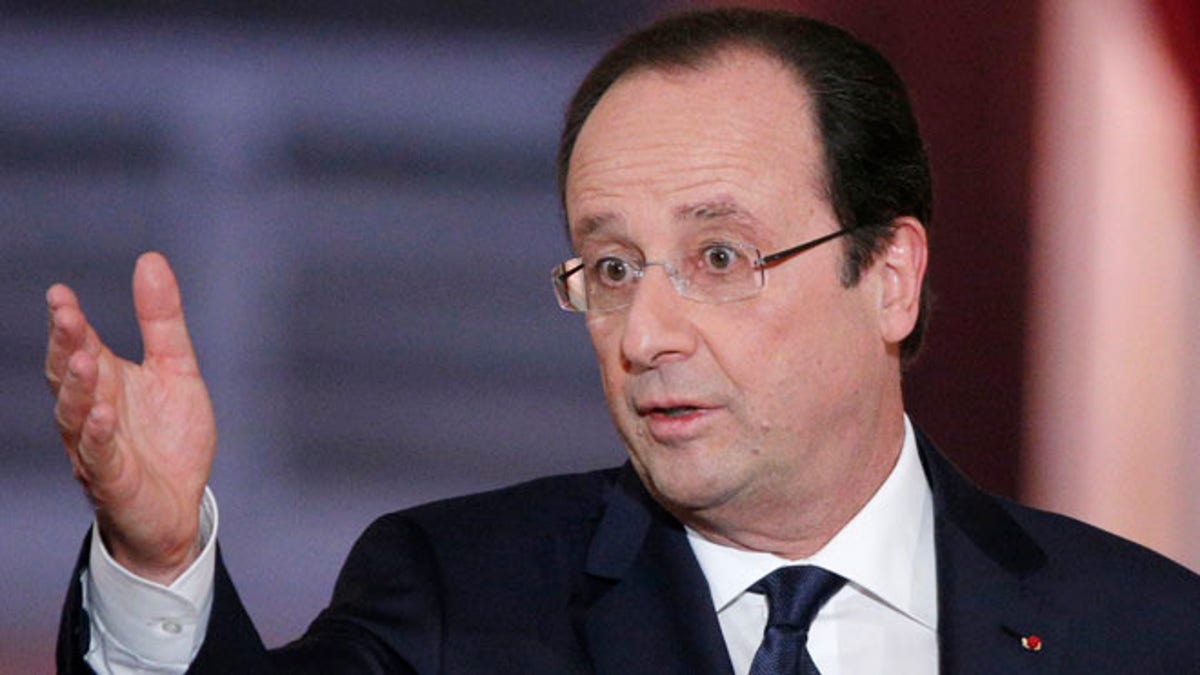
Jan 14, 2014: French President Francois Hollande answers a reporter during his annual news conference. (AP)
French President Francois Hollande is being dogged by further reports about his private life after it was claimed that a love affair in which he had reportedly been engaged took place in an apartment linked to Corsican mobsters.
French website Mediapart claims the apartment he used to conduct his reported affair with actress Julie Gayet was linked to the Corsican mafia, The Daily Telegraph reports.
Mediapart said the name on the rental lease was that of Michel Ferracci, who in November was given an 18-month suspended sentence in connection with a inquiry into money laundering. The website said the apartment was lent to Gayet, 41, by her friend Emmanuelle Hauck, the former wife of Ferracci.
It added that since separating from her husband, Hauck had lived with François Masini, another Corsican with mafia links who was shot dead last year.
The new claims come on the back of the hospitalization of Hollande's partner, journalist Valerie Trierweiler, when magazine Closer published photos it said proved Hollande's liaison with Gayet.
He was asked following a major economic policy speech Tuesday whether Trierweiler remains the first lady. In his first comments since the magazine report, Hollande responded: "Everyone in his or her personal life can go through ordeals -- that's the case with us."
Hollande said his "indignation is total" over the report, calling it a "violation that touches a personal liberty." He did not say whether the report is true.
The latest revelations call into question whether a complex personal life can be private for someone with round-the-clock bodyguards, and about the role of "first lady" in France. Trierweiler is the first person to hold the post who was not married to the president.
Hollande said he will clarify who is the first lady before he takes a presidential trip to the United States on Feb. 11, but he wouldn't comment further. He said that state funds spent on the first lady should be made public -- and "as small as possible." The first lady doesn't have formal status in France, but in practice they have an office in the presidential palace and small staff.
The pictures published in Closer included one of a man the magazine said was Hollande being ferried by motorcycle to an apartment where Gayet waited.
The issue even reached the floor of parliament Tuesday. A leading legislator from the opposition conservative UMP party accused the president of taking unreasonable risks with his security.
"The president is not a normal citizen during his term. He is the chief of our armies. He is the keystone of our institutions. His protection should not suffer from any amateurism," Jacob said in the National Assembly. "The president should be aware of the level of responsibility that he exercises, be aware that his role is greater than his person, and be aware that he incarnates the image of France in the eyes of the world."
Asked whether his security was compromised, Hollande said, "My security is assured everywhere, and at any moment. When I travel officially ... and when I travel on a private basis, I have protection that is less suffocating. But I am protected everywhere."
He left open the possibility of suing Closer for the publication of the photos.
Photographer Sebastian Valiela said he was surprised at the lack of security for Hollande, whose government has been repeatedly threatened by Al Qaeda.
"To go to the rendezvous with Julie Gayet, he was taking some risks," he told RTL. "As soon as he got into the apartment, his guards left."
Twenty years ago, Valiela, rocked France's political establishment with images that revealed the secret family of then-President Francois Mitterrand, showing the Socialist leader emerging from a restaurant with the daughter he had never acknowledged.
Hollande, who has four children from a previous relationship with a leading politician, was elected as a "Monsieur Normal" in a backlash against his flamboyant predecessor Nicolas Sarkozy.
Dominique Moisi, a French political analyst, said Hollande -- who was already the most unpopular president in modern French history before the recent revelations -- had brought the scrutiny on himself.
"He wanted to impress the French with the fact that he was a normal man, that he was a man of dignity, simplicity, moral rigor," he said. "Suddenly the French are discovering that he is like others, but in a less glorious manner, even a ridiculous manner."
The Associated Press contributed to this report.
